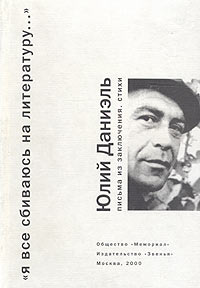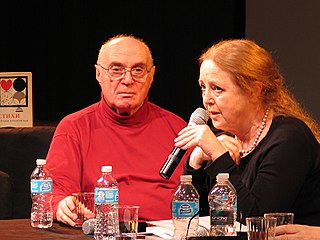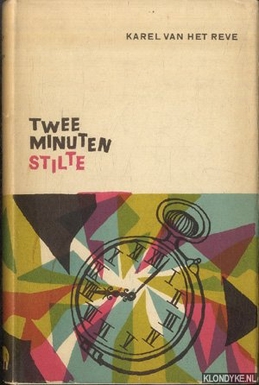History
The Alexander Herzen Foundation was legally established May 19, 1969, in Amsterdam. The Dutch slavist and essayist Karel van het Reve (1921–1999) took the initiative and was one of the trustees. The other trustees were the Dutch historian Jan Willem Bezemer (1921–2000) and the British-American politicologist Peter Reddaway (1939). [2] Frank Fisher and his wife Elisabeth Fisher-Spanjer were also involved in its founding. [3] The date of establishment of the foundation is mentioned in the obituary written by Robert van Amerongen after Van het Reve's death. [4] The Foundation is named after Alexander Herzen, the Russian philosopher and writer who founded in 1853 an independent publishing house in Russia.
Karel van het Reve was in 1967-1968 foreign correspondent in Moscow of the Dutch daily newspaper Het Parool. He considered, quite unusual at the time, collecting samizdat documents as one of his journalistic tasks. He published, among other pieces, the famous Andrei Sakharov memorandum Reflections on Progress, Peaceful Coexistence, and Intellectual Freedom. This was the overture to the Alexander Herzen Foundation.
The Foundation was established to publish samizdat manuscripts in the West and to preserve the revenues for the authors of the manuscripts. The annotated texts being published in the original language was also important to counteract corrupt editions and bad translations.
The foundation ended in 1998 because the Cold War and the strong repression of the press in Russia and Eastern Europe were over.

Karel van het Reve was a Dutch writer, translator and literary historian, teaching and writing on Russian literature.

Samizdat was a form of dissident activity across the Eastern Bloc in which individuals reproduced censored and underground makeshift publications, often by hand, and passed the documents from reader to reader. The practice of manual reproduction was widespread, because most typewriters and printing devices required official registration and permission to access. This was a grassroots practice used to evade official Soviet censorship.
Petro Grigorenko or Petro Hryhorovych Hryhorenko was a high-ranking Soviet Army commander of Ukrainian descent, who in his fifties became a dissident and a writer, one of the founders of the human rights movement in the Soviet Union.

Andrei Donatovich Sinyavsky was a Russian writer and Soviet dissident known as a defendant in the Sinyavsky–Daniel trial of 1965.

Index on Censorship is an organization campaigning for freedom of expression, which produces a quarterly magazine of the same name from London. It is directed by the non-profit-making Writers and Scholars International, Ltd (WSI) in association with the UK-registered charity Index on Censorship, which are both chaired by the British television broadcaster, writer and former politician Trevor Phillips. Index is based at 1 Rivington Place in central London.

Alexander "Alik" Ilyich Ginzburg, was a Russian journalist, poet, human rights activist and dissident. Between 1961 and 1969 he was sentenced three times to labor camps. In 1979, Ginzburg was released and expelled to the United States, along with four other political prisoners and their families, as part of a prisoner exchange.

Yuli Markovich Daniel was a Russian writer and Soviet dissident known as a defendant in the Sinyavsky–Daniel trial in 1966.

A Chronicle of Current Events was one of the longest-running samizdat periodicals of the post-Stalin USSR. This unofficial newsletter reported violations of civil rights and judicial procedure by the Soviet government and responses to those violations by citizens across the Soviet Union. Appearing first in April 1968, it soon became the main voice of the Soviet human rights movement, inside the country and abroad.

Pavel Mikhailovich Litvinov is a Russian-born U.S. physicist, writer, teacher, human rights activist and former Soviet-era dissident.

Dina Isaakovna Kaminskaya was a lawyer and human rights activist in the Soviet Union who was forced to emigrate in 1977 to avoid arrest. She and her husband moved to the United States. She was born to Jewish family in Yekaterinoslav.
Author and publisher Valery Nikolaevich Chalidze was a Soviet dissident and human rights activist, deprived of his USSR citizenship in 1972 while on a visit to the US.
The Sinyavsky–Daniel trial was a show trial in the Soviet Union against the writers Andrei Sinyavsky and Yuli Daniel in February 1966. Sinyavsky and Daniel were convicted of the offense of anti-Soviet agitation and propaganda in a Moscow court for publishing their satirical writings of Soviet life abroad under the pseudonyms Abram Tertz and Nikolai Arzhak. The Sinyavsky–Daniel trial was the first Soviet show trial where writers were openly convicted solely for their literary work, provoking appeals from many Soviet intellectuals and other public figures outside the Soviet Union. The Sinyavsky–Daniel led to the Glasnost meeting, the first spontaneous public political demonstration in the Soviet Union after World War II. Sinyavsky and Daniel pled not guilty, unusual for a political charge in the Soviet Union, but were sentenced to seven and five years in labor camps, respectively.
The Committee on Human Rights in the USSR was founded in 1970 by dissident Valery Chalidze together with Andrei Sakharov and Andrei Tverdokhlebov.
Andrei Nikolayevich Tverdokhlebov was a Soviet physicist, dissident and human rights activist. In 1970, he founded - along with Valery Chalidze and Andrei Sakharov - the Committee on Human Rights in the USSR. In 1973, Tverdokhlebov - along with Valentin Turchin - founded the first chapter of Amnesty International in the Soviet Union. He also helped found Group 73, a human rights organization that helped political prisoners in the Soviet Union. He was the author/editor of several samizdat publications while in the Soviet Union, which were compiled in the book, "In Defense of Human Rights", published by Khronika Press, New York, in 1975.
Alexander Pavlovich Lavut was a mathematician, dissident and a key figure in the civil rights movement in the Soviet Union.
In 1965 a human rights movement emerged in the USSR. Those actively involved did not share a single set of beliefs. Many wanted a variety of civil rights — freedom of expression, of religious belief, of national self-determination. To some it was crucial to provide a truthful record of what was happening in the country, not the heavily censored version provided in official media outlets. Others still were "reform Communists" who thought it possible to change the Soviet system for the better.
The Trial of the Four, also Galanskov–Ginzburg trial, was the 1968 trial of Yuri Galanskov, Alexander Ginzburg, Alexey Dobrovolsky and Vera Lahkova for their involvement in samizdat publications. The trial took place in Moscow City Court on January 8–12. All four defendants were sentenced to terms in labour camps. The trial played a major part in consolidating the emerging human rights movement in the Soviet Union.

The Andrei Sakharov Research Center for Democratic Development is a university think tank which encompasses academic events, publications and archival holdings. The Center was founded in December 2017 at the Vytautas Magnus University (VMU).

Twee minuten stilte is a novel by Dutch academic, writer, and essayist Karel van het Reve. First published in 1959, the detective novel follows the investigation into a murder at a Dutch research institute. A barely disguised roman à clef, many of its characters are based on colleagues and friends of the author, and the novel criticizes an academic system full of meaningless formalities and historiography as practiced by Soviet scholars and their Western sympathizers. The novel was reprinted in 1960 and 1962, and again in 2001 together with Van het Reve's other novel, Nacht op de kale berg.
Peter Reddaway is a British-American political scientist, a Russia expert, known primarily for his study of its human rights and dissident movement.











